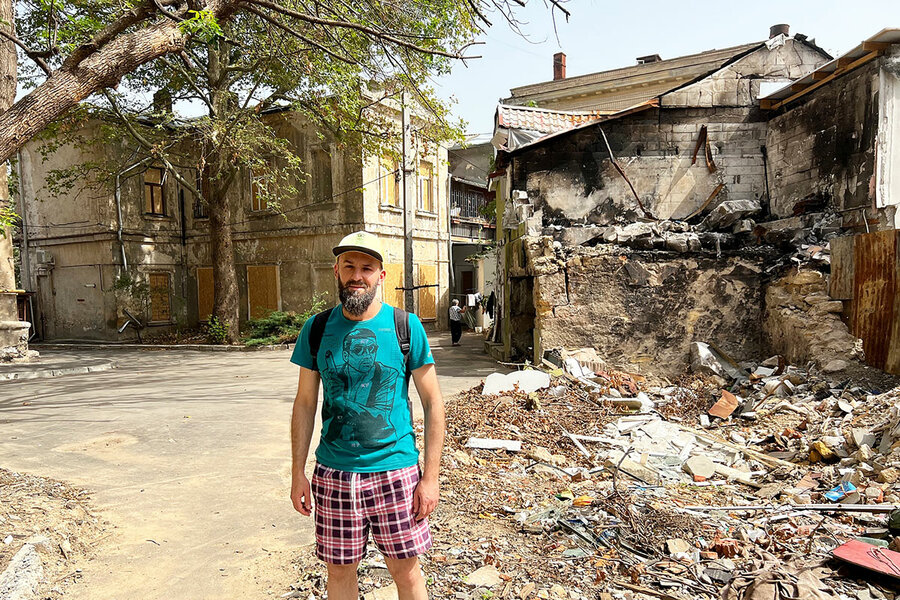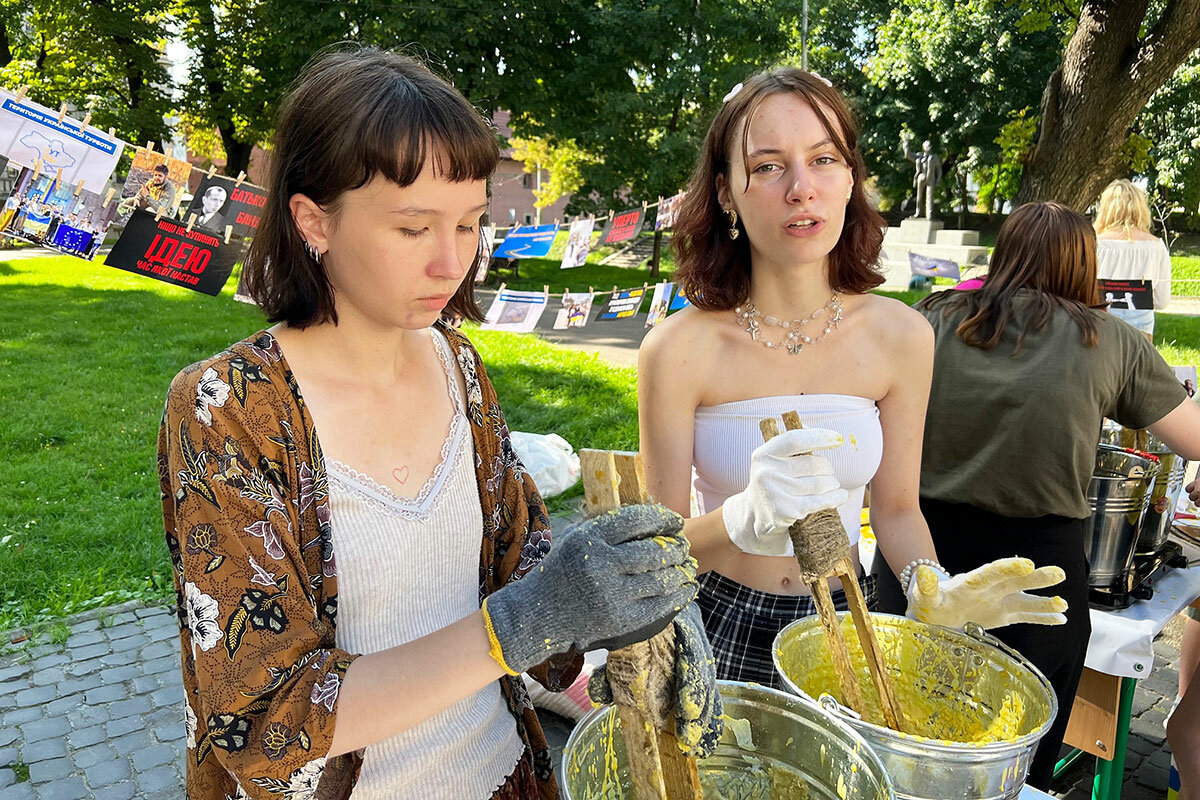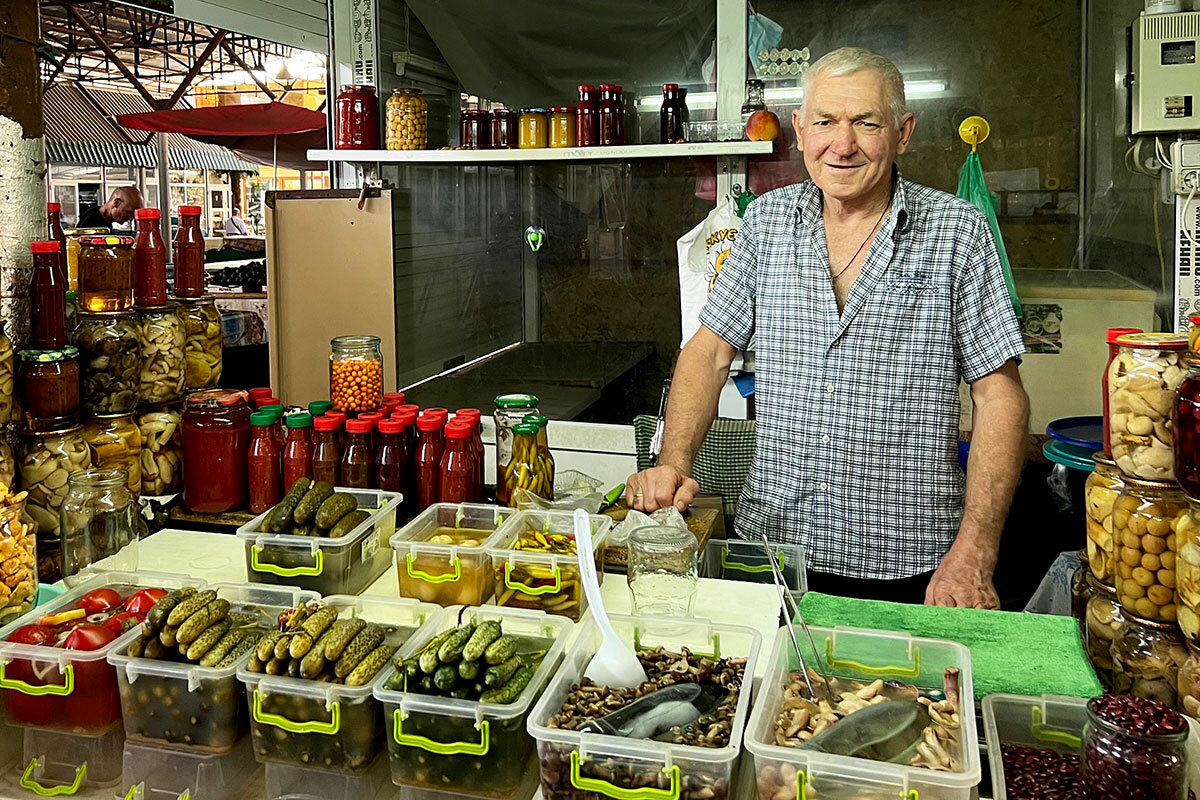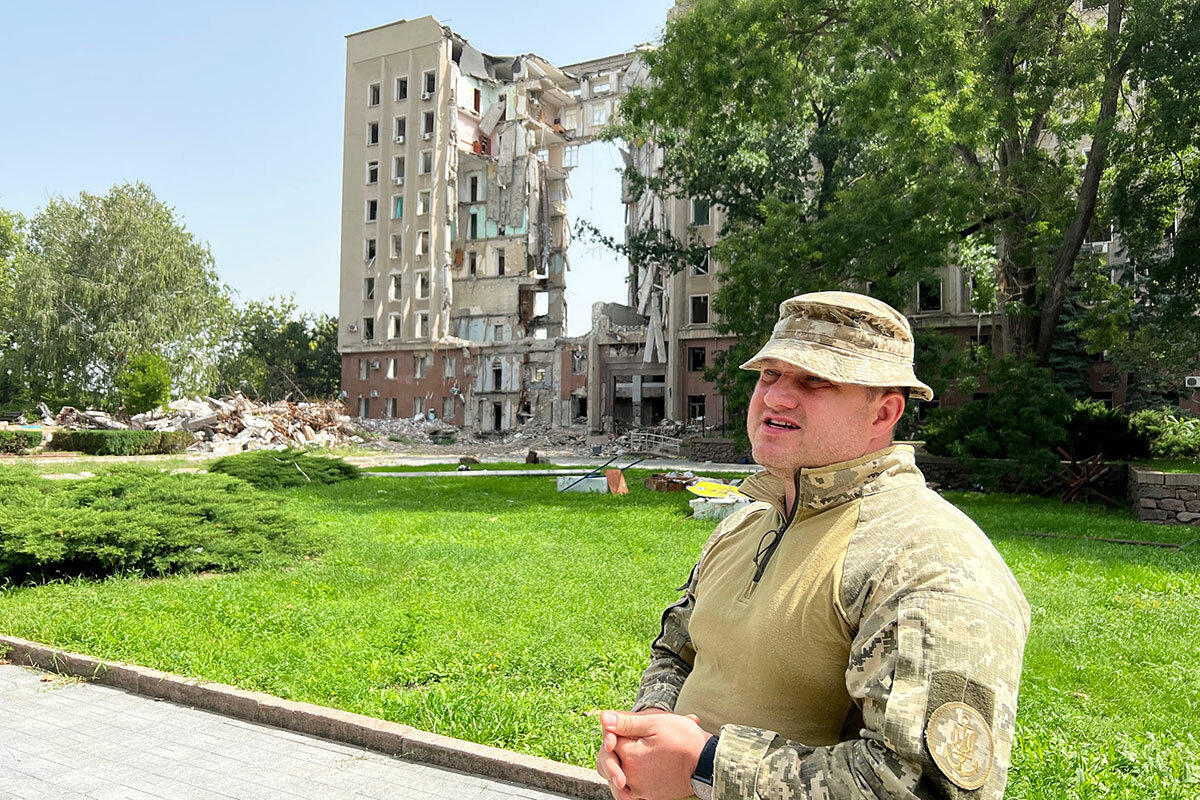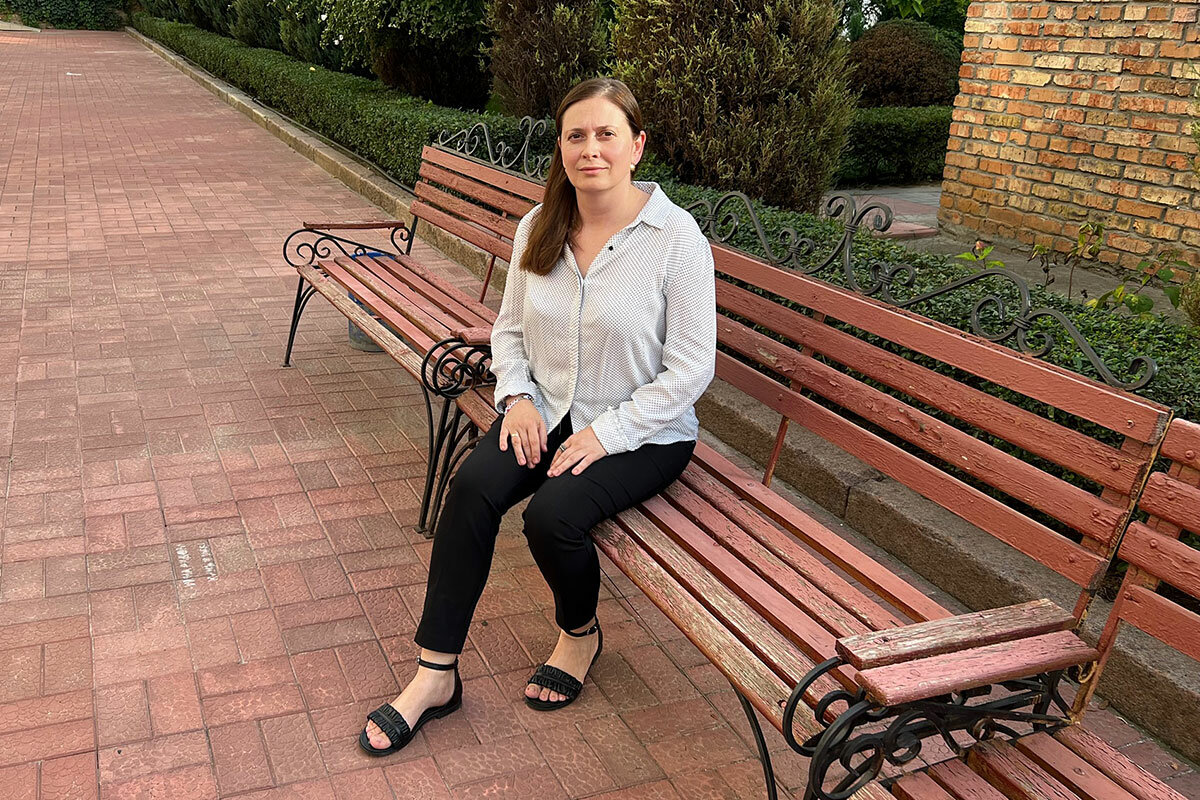For Ukrainians, this year, ‘Russia put independence in our hearts’
Loading...
| Mykolaiv, Ukraine
Before the war’s beginning six months ago and his hometown’s defiant thwarting of a Russian offensive in March, Mykolaiv resident Olekseii Bezverkhnyii says he gave independence little thought, “like something that just fell to us out of the sky.”
Not this year. “Independence is freedom,” he says, the day before Ukraine’s national day. “We feel it now. It’s something we won’t give up.”
Why We Wrote This
A story focused onThat freedom is taken for granted until someone tries to take it away might be a truism. Yet the Monitor’s Howard LaFranchi found this Independence Day to be especially resonant for Ukrainians.
Across Ukraine, average Ukrainians report a similar shift in their perception of Independence Day on Aug. 24, following a Russian invasion that has displaced millions, destroyed cities and villages, and cost thousands of civilians and soldiers their lives.
“If you consider Ukrainian history, you will see that this fight we have for our independence is not new, but it is sharper this year because of the threat we face to our freedom,” says Una, a National Academy of Arts student in the western city of Lviv.
“Many of us feel now that our independence is not something we can rely on others to hand to us,” she says, while crafting small heating and cooking stoves for front-line soldiers to use when cold weather returns. “It is something we all have to take part in and protect together.”
In past years, before Russia’s full-scale invasion of his country six months ago, Olekseii Bezverkhnyii says, he didn’t spend much time pondering the meaning of Ukraine’s independence.
The middle school Ukrainian-language teacher and father of three in this southern city known for shipbuilding and sunflower fields took independence for granted, he says, “like something that just fell to us out of the sky.”
But Tuesday, as he slowly moves up in a long line of neighbors waiting to fill plastic jugs with potable water, and with this Independence Day just a sunrise away, Mr. Bezverkhnyii says the invasion and the ensuing martyrdom of his home city have changed everything.
Why We Wrote This
A story focused onThat freedom is taken for granted until someone tries to take it away might be a truism. Yet the Monitor’s Howard LaFranchi found this Independence Day to be especially resonant for Ukrainians.
“Independence is freedom. We feel it now. It’s something we won’t give up,” he says.
His wife and children have fled to safety in Germany. He’ll carry his water jugs back to a bomb-blasted home that hasn’t had reliable potable water since a Russian missile took out Mykolaiv’s main water conduit from the Dnieper River in March. Later, the army veteran with a scraggly salt-and-pepper beard and an affinity for the Boston Celtics will prepare for his wartime occupation as a volunteer in the civilian Territorial Defense Forces.
And this year, despite or perhaps because of all that, he’ll be thinking this: “Russia did this to us; Russia put independence in our hearts.”
Across Ukraine, average Ukrainians report a similar shift in their perception of Independence Day as the result of an invasion that aimed to take independence away. The war, with its displacement of millions of Ukrainians, the deaths of thousands of soldiers and civilians, and the destruction of cities and villages, has turned Aug. 24 from a welcome day off to a call to action, if not arms.
“If you consider Ukrainian history, you will see that this fight we have for our independence is not new, but it is sharper this year because of the threat we face to our freedom,” says Una, a National Academy of Arts student in the western city of Lviv who requested that her last name be withheld. She spends the afternoon with a group of friends in a city park crafting small heating and cooking stoves for front-line soldiers to use once the weather turns cold this fall.
“Many of us feel now that our independence is not something we can rely on others to hand to us,” says Una, turning a pot of melted beeswax into which she’ll dip cardboard strips to make the pots’ high-heat fuel. “It is something we all have to take part in and protect together.”
Closer to Mykolaiv, in the Black Sea port city of Odesa, Mykola Shamin describes from his pickles stall in New Market how this year, Independence Day will be a day of thanksgiving.
“We won’t be able to see our grandchildren this year, which will be hard for us,” says Mr. Shamin, whose smaller grandchildren have left Odesa for a village in central Ukraine, while an older granddaughter is now in Moldova.
But as he cuts dill stems for his pickling brine, he smiles and offers a more hopeful note. “Right now, my wife is home preparing special food for this day,” he says, “so we will enjoy that and be thankful for the independence we gained 31 years ago” following the collapse of the Soviet Union.
“Part of us will be sad,” he adds, “but we will also be grateful for our president, for the military that is fighting for us so bravely, and for the countries around the world that are contributing to help us keep our freedom.”
In Washington, President Joe Biden marked the day by announcing Tuesday that the United States would provide an additional nearly $3 billion in security assistance.
Ukrainians have been on edge over what this national day might bring, especially since President Volodymyr Zelenskyy began warning earlier this week to expect “something particularly ugly” from Russia as it tried to make a statement about Ukrainian independence. Late in the day, Mr. Zelenskyy said a Russian missile had killed 22 people and wounded 50 at a train station in the Dnipropetrovsk region in the central part of the country.
Everyone recalls that Russian President Vladimir Putin used a speech on the eve of the invasion he launched Feb. 24 to mock the notion of an independent Ukraine and to paint it instead as an indivisible part of the Russian motherland.
On Wednesday, at a small ceremony in Kyiv marking the day with his wife, President Zelenskyy tapped into the national sentiment by declaring Ukraine was “reborn” this year when Russia invaded.
Rejection of the notion of Ukraine as historically and culturally Russian seems especially visceral in Mykolaiv, perhaps in part because the city successfully repelled, at the cost of heavy losses, the Russian offensive aimed at capturing it early in the war. Now Russian forces sit on occupied territory just 20 miles east of the city, while rocket attacks over the summer have continued to kill civilians and damage infrastructure.
With more than half the prewar population of 500,000 having left – as recently as July the mayor responded to a fresh barrage of rocket attacks with a warning to “everyone who wants to stay alive to leave the city” – Mykolaiv is eerily quiet.
People worry about what might befall them overnight, and more long-term what a cold winter might bring. Some say they have heard Mr. Putin is counting on a cutoff of Russian gas – used to heat a shivering Europe – to soften international enthusiasm for Ukraine and bring it to its knees.
They mourn lost relatives and friends, miss terribly those who have left seeking refuge from war, and pray for sons on the front lines.
But they are also defiant.
“I don’t understand why the Russians attacked us; what did we do to deserve this?” asks Liudmila, who stands in the Mykolaiv water line with two large plastic jugs. Her eyes well up and she wipes away tears as she explains that her two sons are both on the front lines to the east, one having entrusted his wife and daughter to her care.
But then something in her eyes shifts at the mention of Independence Day, and replacing tears is a hint of maternal pride and resolve.
“I do not want my sons in this war, but they are doing the right thing,” she says. “They are protecting our homeland.”
Before the war, Mykolaiv was known as a place with considerable Russian sympathies, where Russian was the language of preference over Ukrainian. Once one of the Soviet Union’s major shipbuilding ports, the city maintained strong economic ties to Russia after Ukraine’s independence.
Russia’s siege of the city has abruptly changed that.
Russian place names are gone – Moscow Street is now Mariupol Street – Ukrainian is preferred, and an old notion of Russian brotherhood has vanished.
“For most of our independence we never had any problems with Russia. Mykolaiv was considered pro-Russian; many people here didn’t even think the war in Donbas from 2014 was their war,” says Dmytro Pletenchuk, press officer of the Mykolaiv military administration. “But Russia’s bombardment of our city every night really changed that.”
Walking through the city’s closed-down government center, Captain Pletenchuk turns to the destroyed Mykolaiv administration building, where dozens of civilians were killed in a March 29 missile strike.
“Is that something a brother would do to you?” he asks. “Even my 8-year-old daughter knows who our enemy is now,” he adds, “so in the future there will be no more pro-Russian Mykolaiv.”
For some, Ukraine’s independence, and in particular its separation from Russia, has been an evolution that accelerated with Moscow’s occupation of Crimea and the onset of the smoldering conflict in the Donbas in 2014.
What has happened this year, and what Anastasia Khmel says she will celebrate this Independence Day, is something different, “a change in mentality that has taken something that was on paper and made it a fact for Ukrainians.”
Dean of political sciences at Mykolaiv’s Black Sea National University, Professor Khmel says the war finally broke the hold over her city of the “Russian propaganda” that denied any idea of Ukrainian independence.
“What has happened is that this aggression has made independence something real, not just a thing to celebrate one day, but a path for moving towards the future instead of back to the past,” she says.
“This change has put independence in people’s hearts,” she says, adding, “That makes this year a point of no return.”
Oleksandr Naselenko supported reporting for this story.




